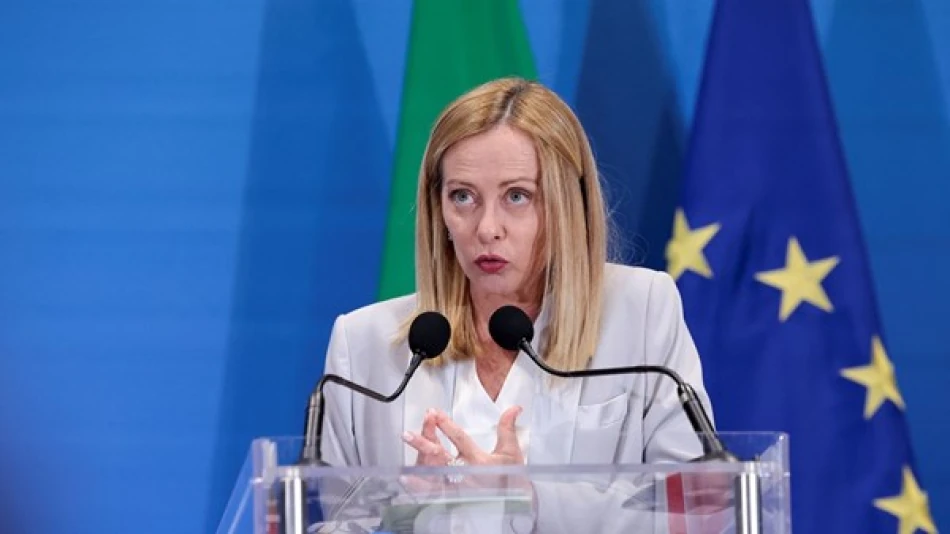
Italy Expresses 'Grave Concern' Over Israel's Plan to Occupy Gaza
Italy's Meloni Breaks Ranks with Strong Condemnation of Israel's Gaza Occupation Plans
Italian Prime Minister Giorgia Meloni has delivered her strongest criticism yet of Israeli military actions, expressing "grave concern" over Israel's plans for Gaza occupation during a phone call with Palestinian President Mahmoud Abbas. Her remarks signal a notable shift from a leader traditionally aligned with conservative pro-Israel positions, highlighting growing European unease with Israel's expanding military objectives.
A Calculated Diplomatic Pivot
Meloni's intervention comes at a critical juncture as Israel faces mounting international isolation over its Gaza strategy. During Monday's call with Abbas, the Italian leader described the humanitarian situation in Gaza as "unjustified and unacceptable" while warning that recent Israeli decisions appear designed to trigger "new military escalation."
This marks Meloni's first public commentary on Israel's controversial occupation blueprint, which has drawn sharp rebukes from traditional allies including France and Germany. Her decision to engage directly with Palestinian leadership suggests Italy is positioning itself as a potential mediator in future peace negotiations.
Strategic Implications for European Unity
Breaking Conservative Solidarity
Meloni's stance represents a significant departure from the typical alignment between right-wing European leaders and Israeli policy. Unlike Hungary's Viktor Orbán or Czech leadership, who have maintained unwavering support for Israeli actions, Italy's prime minister appears to be prioritizing regional stability over ideological consistency.
The timing coincides with growing pressure on European governments to take more assertive positions as civilian casualties mount and humanitarian conditions deteriorate. Italy's Mediterranean position makes it particularly vulnerable to refugee flows and regional instability, creating domestic pressure for diplomatic intervention.
Economic and Security Calculations
Italy's energy partnerships with Middle Eastern nations, including recent agreements with Algeria and Egypt, likely influence Meloni's more balanced approach. The country's role as a gateway between Europe and North Africa makes maintaining relationships across the region essential for both economic and security interests.
Additionally, Italy hosts significant Palestinian and Arab communities whose political influence has grown in recent years, creating domestic pressure for more assertive diplomacy.
Global Context and Precedents
Meloni's position aligns Italy more closely with emerging international consensus, as evidenced by recent UN Security Council discussions and growing calls for ceasefire from traditional Israeli allies. Her approach mirrors similar recalibrations by leaders in Spain and Ireland, who have taken increasingly critical stances despite historical support for Israeli security concerns.
The Italian intervention also reflects broader European anxiety about American diplomatic leadership in the region, with EU nations increasingly willing to chart independent courses on Middle Eastern policy. This trend accelerated following the Afghanistan withdrawal and has intensified during the current crisis.
Looking Forward: Implications for Regional Diplomacy
Italy's more assertive stance could position Rome as a key player in eventual reconstruction efforts and peace negotiations. The country's historical ties to both Israeli and Palestinian communities, combined with its Mediterranean location, make it a natural venue for future diplomatic initiatives.
For Israel, losing support from conservative European allies like Meloni represents a concerning trend that could translate into concrete policy consequences, including potential arms embargoes or economic restrictions. The Italian position may encourage other wavering European leaders to adopt more critical stances, further isolating Israeli policy internationally.
Meloni's calculated pivot demonstrates how even ideologically sympathetic leaders are finding Israel's current trajectory politically unsustainable, suggesting broader shifts in international support that could reshape regional dynamics in the months ahead.
Most Viewed News

 Layla Al Mansoori
Layla Al Mansoori






